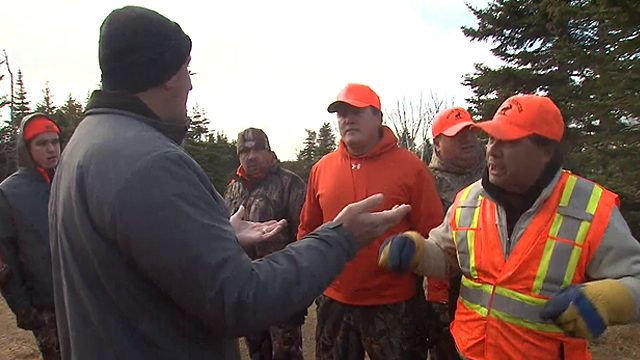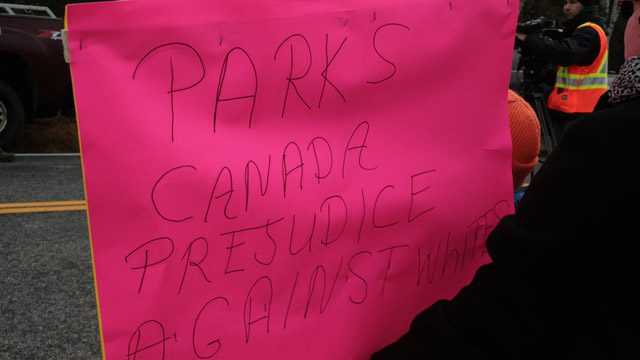(Scientists say an over-abundance of moose has degraded the woodlands in the Cape Breton National Park. Photo: Trina Roache/APTN)
Trina Roache
APTN National News
HALIFAX — Mi’kmaw leaders in Nova Scotia said Friday that the moose harvest in the Cape Breton Highlands National Park will continue this fall, despite a tense confrontation between hunters and protesters Wednesday.
“We ask the Mi’kmaq community to remain calm and not escalate the situation,” said We’koqma’q Chief Rod Googoo in a statement. “We are committed to work with Parks Canada and the RCMP to develop appropriate security and the Mi’kmaq are committed to completing the harvest and the health of the ecosystem. We will not be intimidated into leaving the Park.”
A small group of Mi’kmaw hunters were confronted Wednesday by a group opposed to them harvesting moose harvest in the park.
30 people who live near the national park, many who make money through hunting or as hunting guides, marched into the Mi’kmaq campsite, demanding the harvest stop.
“To me, they presented themselves as a bunch of bullies…who want their own way,” said Mi’kmaw harvester Danny Paul. “And they bullied the government into submitting today with Parks Canada to suspend the operation of this hunt.”
As news of the confrontation spread, reaction on social media was swift.
There was a range of reaction on Facebook:
“…the public need an education on Aboriginal rights…We have first access to harvest…” “Know your treaty … practice your treaty … defend your treat.”
On Wednesday, when wardens agreed to escort two of them to the Mi’kmaw hunter’s campsite, the others followed and words were shared.

“Give up on this hunt,” said local businessman Wesley Timmons. “We don’t see it being productive to kill moose in our national park.”
“Productive?” asked Fred Bernard, a Mi’kmaw harvester. “The whole mountain is Crown land. We’re doing this as a UINR project, all these guys,” he yelled, pointing at the protesters, “are outfitters and guides and they’re crying about the moose.”
“I’m not against natives, buddy, I got lots of native friends,” said one protester. “We want to hunt as much as you want to hunt. It’s the park and you guys got the right to hunt here right? I just want to get a share of it.”
“What we’re telling you and we’re saying it again, it’s not all about moose,” said Clifford Paul, with Unama’ki Institute of Natural Resources (UINR). “It’s all about the ecosystem.”
Paul is in charge of moose management for the Unama’ki Institute of Natural Resources. His organization, along with Assembly of Nova Scotia Chiefs, has worked with Parks Canada for the last two years to organize this harvest.
It’s the first hunt ever in a national park in Nova Scotia.
It’s part of a pilot project to bring back the boreal forest.
An over-abundance of moose has degraded the woodlands. An agreement signed in 2012 gives the Mi’kmaq first access, but the harvest itself is not an exercise in treaty rights, but an effort to regenerate the forests in the park.
The harvest is limited to a 20 square kilometre area, and could see a harvest of 30 to 35 moose.
Protesters say two harsh winters has seen a decline in the number of moose in the park.
Derek Quann, a resource conservation manager, says Parks Canada is glad to hear observations from the local community. But he says the moose population is thriving, with about 1800 moose in the whole park.
“It’s a way to remove the influence the moose have from browsing on the forest ecosystem in this area,” said Quann. “One third of the boreal forest in the Cape Breton Park is severely degraded. Eleven per cent of the forest has transformed to grassland.”
When Parks Canada suspended the harvest, the protesters declared victory and left. But charges against the protesters are possible. The group illegally entered an area restricted to the public because of the hunt.
“We appreciate and respect people’s passion,” said Quann. “But we also expect that people will follow the rules and if they have opposition that they will express it in a peaceful, respectful way.”
“Our harvesters need to operate in a safe environment and the situation could have become much worse,” said Gogoo. “We have asked Parks Canada to determine if charges will be made and leave it to their discretion.”

On the one hand, the protesters relayed concerns over conservation. But they also want to take part in the moose hunt.
Clifford Paul points out, “The future of moose and the future of moose management jurisdiction lies with the Mi’kmaw people.”
But adds that shouldn’t put people on opposite sides of the fence.
“We know there’s a problem of hyper-abundance in the park, we know that the ecosystem is damaged,” said Paul. “Despite the little thing you saw today, these heated voices? We’re still willing to work together.”
“We are proud of our harvesters for their bravery and actions in minimizing the confrontation with the demonstrators,” said We’koqma’q Chief Rod Googoo in a statement released today. “Their safety is always our first concern and their handling of the situation, while avoiding escalation, was extremely well done.”
Got a comment? Send it to us.









